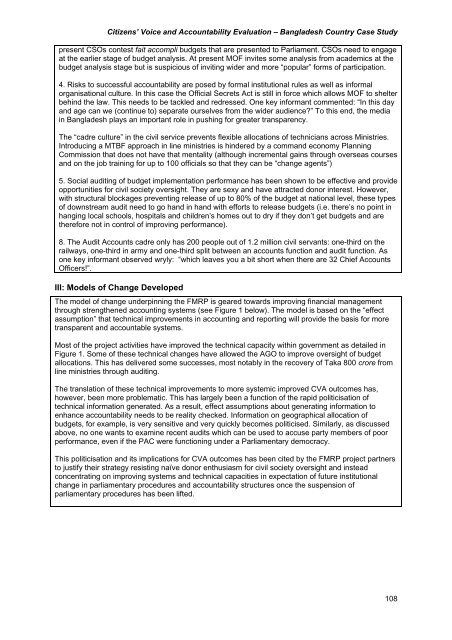Bangladesh - Belgium
Bangladesh - Belgium
Bangladesh - Belgium
You also want an ePaper? Increase the reach of your titles
YUMPU automatically turns print PDFs into web optimized ePapers that Google loves.
Citizens’ Voice and Accountability Evaluation – <strong>Bangladesh</strong> Country Case Study<br />
present CSOs contest fait accompli budgets that are presented to Parliament. CSOs need to engage<br />
at the earlier stage of budget analysis. At present MOF invites some analysis from academics at the<br />
budget analysis stage but is suspicious of inviting wider and more “popular” forms of participation.<br />
4. Risks to successful accountability are posed by formal institutional rules as well as informal<br />
organisational culture. In this case the Official Secrets Act is still in force which allows MOF to shelter<br />
behind the law. This needs to be tackled and redressed. One key informant commented: “In this day<br />
and age can we (continue to) separate ourselves from the wider audience?” To this end, the media<br />
in <strong>Bangladesh</strong> plays an important role in pushing for greater transparency.<br />
The “cadre culture” in the civil service prevents flexible allocations of technicians across Ministries.<br />
Introducing a MTBF approach in line ministries is hindered by a command economy Planning<br />
Commission that does not have that mentality (although incremental gains through overseas courses<br />
and on the job training for up to 100 officials so that they can be “change agents”)<br />
5. Social auditing of budget implementation performance has been shown to be effective and provide<br />
opportunities for civil society oversight. They are sexy and have attracted donor interest. However,<br />
with structural blockages preventing release of up to 80% of the budget at national level, these types<br />
of downstream audit need to go hand in hand with efforts to release budgets (i.e. there’s no point in<br />
hanging local schools, hospitals and children’s homes out to dry if they don’t get budgets and are<br />
therefore not in control of improving performance).<br />
8. The Audit Accounts cadre only has 200 people out of 1.2 million civil servants: one-third on the<br />
railways, one-third in army and one-third split between an accounts function and audit function. As<br />
one key informant observed wryly: “which leaves you a bit short when there are 32 Chief Accounts<br />
Officers!”.<br />
III: Models of Change Developed<br />
The model of change underpinning the FMRP is geared towards improving financial management<br />
through strengthened accounting systems (see Figure 1 below). The model is based on the “effect<br />
assumption” that technical improvements in accounting and reporting will provide the basis for more<br />
transparent and accountable systems.<br />
Most of the project activities have improved the technical capacity within government as detailed in<br />
Figure 1. Some of these technical changes have allowed the AGO to improve oversight of budget<br />
allocations. This has delivered some successes, most notably in the recovery of Taka 800 crore from<br />
line ministries through auditing.<br />
The translation of these technical improvements to more systemic improved CVA outcomes has,<br />
however, been more problematic. This has largely been a function of the rapid politicisation of<br />
technical information generated. As a result, effect assumptions about generating information to<br />
enhance accountability needs to be reality checked. Information on geographical allocation of<br />
budgets, for example, is very sensitive and very quickly becomes politicised. Similarly, as discussed<br />
above, no one wants to examine recent audits which can be used to accuse party members of poor<br />
performance, even if the PAC were functioning under a Parliamentary democracy.<br />
This politicisation and its implications for CVA outcomes has been cited by the FMRP project partners<br />
to justify their strategy resisting naïve donor enthusiasm for civil society oversight and instead<br />
concentrating on improving systems and technical capacities in expectation of future institutional<br />
change in parliamentary procedures and accountability structures once the suspension of<br />
parliamentary procedures has been lifted.<br />
108

















